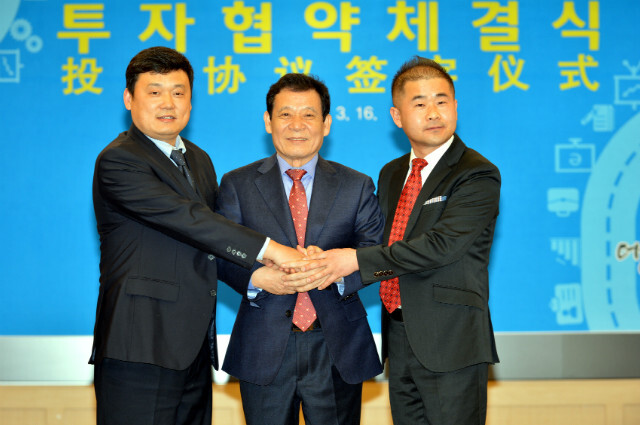hankyoreh
Links to other country sites 다른 나라 사이트 링크
First-ever Chinese-owned electric car plant coming to S. Korea

The city of Gwangju is hitting the ignition on a “million-car” production base with a drive for investment from a Chinese automaker.
On Mar. 16, the city signed an investment intention agreement for the establishment of a local South Korean branch of Joylong Automobile and a local factory for the production of finished cars. The event in the city government complex business room was attended by Mayor Yoon Jang-hyeon along with vice president and CTO Ou Yangguang and international division president and general manager Lin Quanhong from Joylong and Peppern Auto Group representative Kim Tae-hyeok.
The agreement commits Joylong to investing 250 billion won (US$212 million) in Gwangju through 2020 to build a factory with a production capacity 20,000 electric vans and 100,000 electric cars a year. The company plans to start in late 2016 with the production of around 200 test and commercial vehicles in Gwangju. For its next step, it plans to begin production of 2,000 E6 electric vans with 15- to 18-person capacity in 2017, before finishing a factory in 2020 for the mass-production of 20,000 electric vans and 80,000 other vehicles. The city is to provide support for certification issues, including those related to domestic safety standards for the electric vans produced by Joylong.
Once built, it would be the first large-scale finished car factory in South Korea for a Chinese automaker. Founded in 2007 with a base in Yangzhou, Joylang produces vans and small buses, with five models of electric cars in addition to its diesel- and gasoline-running vehicles.
For now, Joylong is planning to show its electric vans at the International Electric Vehicle Expo, which kicks off in Jeju Island on Mar. 18. The company hopes to take advantage of terms allowing vehicles with more than 51% of their parts produced locally to be sold as “made in Korea” - using Gwangju as a foothold for advancing into Southeast Asia and the global market in general.
The city expects the investment to have a positive impact on a million-car cluster building project. For the effort, it is spending 397.9 billion won (US$337.4 million) to build a national automobile industry complex and automobile parts industry cluster between 2016 and 2021 on a 4.06 million square meter (1.23 million pyeong) site in the Bitgeurin Industrial Complex, which is currently being developed on the border between Gwangju and Hampyeong County, South Jeolla Province. The aim is to develop promising technologies for electric cars and other environmentally friendly vehicles. The million-car cluster project is expected to gain steam once it passes a pre-feasibility survey in a Ministry of Strategy and Finance assessment lasting until next month.
“We‘re also planning to advise Joylong on site in the Bitgeurin Complex,” said Lee Sang-bae, head of Gwangju’s strategy industry headquarters.
“This investment from a Chinese company is poised to be an important moment in terms of drawing future investment in environmentally friendly vehicles from automakers in South Korea and abroad.”
By Jung Dae-ha, Gwangju correspondent
Please direct questions or comments to [english@hani.co.kr]

Editorial・opinion
![[Column] Park Geun-hye déjà vu in Yoon Suk-yeol [Column] Park Geun-hye déjà vu in Yoon Suk-yeol](https://flexible.img.hani.co.kr/flexible/normal/500/300/imgdb/original/2024/0424/651713945113788.jpg) [Column] Park Geun-hye déjà vu in Yoon Suk-yeol
[Column] Park Geun-hye déjà vu in Yoon Suk-yeol![[Editorial] New weight of N. Korea’s nuclear threats makes dialogue all the more urgent [Editorial] New weight of N. Korea’s nuclear threats makes dialogue all the more urgent](https://flexible.img.hani.co.kr/flexible/normal/500/300/imgdb/original/2024/0424/7317139454662664.jpg) [Editorial] New weight of N. Korea’s nuclear threats makes dialogue all the more urgent
[Editorial] New weight of N. Korea’s nuclear threats makes dialogue all the more urgent- [Guest essay] The real reason Korea’s new right wants to dub Rhee a founding father
- [Column] ‘Choson’: Is it time we start referring to N. Korea in its own terms?
- [Editorial] Japan’s rewriting of history with Korea has gone too far
- [Column] The president’s questionable capacity for dialogue
- [Column] Are chaebol firms just pizza pies for families to divvy up as they please?
- [Column] Has Korea, too, crossed the Rubicon on China?
- [Correspondent’s column] In Japan’s alliance with US, echoes of its past alliances with UK
- [Editorial] Does Yoon think the Korean public is wrong?
Most viewed articles
- 1[Column] Park Geun-hye déjà vu in Yoon Suk-yeol
- 2N. Korean hackers breached 10 defense contractors in South for months, police say
- 3Thursday to mark start of resignations by senior doctors amid standoff with government
- 4[Editorial] New weight of N. Korea’s nuclear threats makes dialogue all the more urgent
- 5Kim Jong-un expressed ‘satisfaction’ with nuclear counterstrike drill directed at South
- 6Will NewJeans end up collateral damage in internal feud at K-pop juggernaut Hybe?
- 7[Editorial] Japan’s rewriting of history with Korea has gone too far
- 8[Cine feature] A new shift in the Korean film investment and distribution market
- 9[Column] ‘Choson’: Is it time we start referring to N. Korea in its own terms?
- 10[Column] The clock is ticking for Korea’s first lady